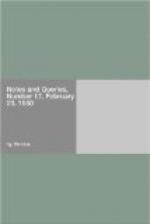I may add too, in conclusion, that Camden is wrong in suggesting that Armach (as he spells it, retaining, curiously enough, the correct etymology of the last syllable) is identical with Dearmach (where the last syllable ought to be magh). This latter place is the well-known Durrow, in the county Westmeath; and its name, in Irish, is Duir-magh, which is really a compound from magh, a plain. Bede tells us, that the word signified, in the Scottish language, Campus roborum (see Bede, Hist. Eccl. lib. iii. c. 4.); but Adamson (Vit. Columbae, c. 39.) more correctly translates it, “monasterium Roboreti Campi.” It is not likely that such authorities could confound Durrow, in Westmeath, with the ecclesiastical metropolis of Ireland, and patriarchal see of St. Patrick.
Whoever the Mach or Macha was from whom Ardmacha has its name (whether the queen called Macha-mong-ruadh, whose reign is assigned by O’Flaherty to A.M. 3603, or the older Macha, who is said to be the wife of Nemedius), it should be borne in mind, that the word whose etymology is required is ARDMACHA[16], and not Armagh. What would be thought of the critic who would now attempt to investigate the etymology of the English word bishop, by dividing it into two syllables, and seeking analogies in sound for each syllable.
I have ventured to go at greater length into this matter than its importance may seem to warrant, because it illustrates so clearly a very general error, from which Celtic literature has deeply suffered, of inventing fanciful etymologies adapted to the modern English spellings, instead of the original Celtic forms of names; and this error, as the question before us proves, is as old as Camden’s time, and older.
J.H. TODD.
Trin. Coll. Dublin, Feb. 2, 1850.
[16] Those who have access
to Colgan’s Acta Sanctorum
Hiberniae will see that
he always spells Armagh, Ardmacha;
and Durrow, Durmugia.
* * * * *{265}
WILLIAM BASSE AND HIS POEMS.
I read with great pleasure MR. COLLIER’S interesting paper on “William Basse and his Poems,” inserted in your 13th Number. Very little is known of this once popular poet, but it is very desirable that that little should be collected together, which cannot be better effected than through the friendly system of inter-communication established by your valuable journal.
From my limited researches upon this subject, it appears that there were two poets of the name of William Basse. Anthony Wood (Athen. Oxon., edit. Bliss. iv. 222.) speaks of one William Basse, of Moreton, near Thame, in Oxfordshire, who was some time a retainer of Lord Wenman, of Thame Park, i.e. Richard Viscount Wenman, in the peerage of Ireland. And I find among my MS. biographical collections that a William Basse, of Suffolk, was admitted a sizar of




